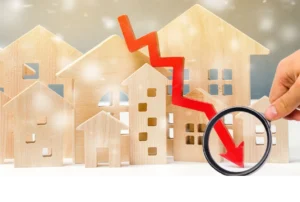Should I Put My Money into a Condo Rental?
 You’d like to expand your investment portfolio of rental homes but today’s hot market for single-family houses has removed any chance of turning a profit for the foreseeable future. Current rents are also high, but not high enough to cover a significant shortfall. Apartment buildings are beyond your budget, leaving condos as your only option.
You’d like to expand your investment portfolio of rental homes but today’s hot market for single-family houses has removed any chance of turning a profit for the foreseeable future. Current rents are also high, but not high enough to cover a significant shortfall. Apartment buildings are beyond your budget, leaving condos as your only option.
If all the conditions are right, condominiums can be a very attractive place to invest your money. After all, the price is usually lower than a single-family home, duplex or a small apartment building and someone else must cope with the landscaping, exterior maintenance and everyday upkeep for you.
Once you have located a condo or multi-story townhome that might be a good addition to your rental portfolio, it is time to do your due diligence. Ask questions about the Homeowners Association (HOA), including what their rules are and how well it is managed. Inquire about the owner-occupancy rate to determine how it may affect your financing options. Is property management doing its job and are the grounds well-maintained? And most importantly, the return on investment (ROI) must meet your investing goals.
The HOA
Consisting of resident homeowners and outside investors, the HOA is the dominant force in a condominium community. The board members set the rules and then make sure those rules are followed. Read the condo regulations to ascertain what the condo association is responsible for and what owners must take care of. Include this request with any offer and complete your review of the documents before the contract’s due diligence period expires. Once you own the property, it is also a good idea to become a member of the HOA governing board to ensure that your best interests are protected.
Some of the freedoms enjoyed by single-family home owners are not available to the owners of condominiums. You’ll probably need permission from the HOA to make such changes to your unit as painting your front door a different color or putting up a mailbox that doesn’t match your neighbors’ boxes.
The association serves as a policing force that prevents owners from neglecting their property and discourages bad behavior by residents. This control helps maintain home values and makes the property attractive, which is important whether you’re seeking new tenants or looking to sell the unit.
Property owners pay an HOA fee on their condo to cover maintenance and repairs for shared items, such as landscaping, roofing, parking and pools. Find out if expensive features like HVAC systems and shared amenities are up-to-date and are on a schedule for regular maintenance. Does the HOA have enough money to stay current on their regular obligations and enough reserves for large maintenance projects?
In addition to monthly fees, you may occasionally be responsible for an expensive one-time “special assessment.” An assessment is an additional fee levied on each owner for a specific project, such as repaving or reroofing. You’ll need to budget for fee increases so that you don’t get into a position where you can’t pay the condo fees or special assessment.
Rental Restrictions
Some HOAs prohibit rentals while others have specific rental restrictions. In some cases, owners are permitted to rent their condos only after they have owned them for a specified period, such as a full year. The condo association may also limit the number of occupants, the length of the lease and other curbs on your use of the condo.
Owner-Occupancy
You want to choose a condominium complex where over 50% of the occupants are owners. Because renters don’t have a financial interest in the condition of the property and shared common spaces, normal financing institutions, such as FHA, VA and conventional lenders, won’t approve a condominium buyer for the most favorable mortgages. A conventional lender will generally grant a loan only if the building is at least 50% owner-occupied and has a homeowners’ association with a low delinquency rate and no ongoing litigation. The HOA by-laws often state that only a percentage of the units can be tenant-occupied in the hope that pride of ownership will translate to better kept community amenities.
Amenities
The more sought-after amenities the condominium complex offers, the more desirable it is to tenants. Of course, these features might add to your purchase price, but they will also increase the rent you can ask for. Look for swimming pools, a fitness room, club room and even tennis courts to entice renters. They will result in quicker renting times and a more consistent occupancy rate.
Maintenance
One of the most obvious benefits of condo ownership is that other people do the exterior property maintenance for you. You own the space inside the condo but not the building’s exterior structure. The condo association handles the cost and the stress of landscapers, roofers, pool service, etc. This may vary according to the regulations of the individual condo board, so again, ask to see them when you are considering a property.
Profitability
It is easy to be won over by a low asking price, great amenities and a desirable location, but before you buy, you want to analyze an investment condo’s cash flow potential. You want to make sure that your condo will generate adequate cash flow over time, even accounting for things like vacancy, maintenance costs and special assessments.
Because it is typically less expensive to purchase a condo than a single-family home with similar amenities, you can give a lower down payment toward your mortgage. It is imperative that the rent you charge covers all your ownership costs, including the monthly HOA fee as well as potential interior maintenance costs that you will be responsible for, such as electrical and plumbing costs not to be paid by the tenant. There’s no concrete recommendation but setting aside 10% of the rent to cover vacancies and another 10% to cover any maintenance costs or special assessments is a sufficiently conservative approach. On the other hand, you will not be responsible for monthly payments to gardeners, pool cleaners, etc.
Should I Put My Money into a Condo Rental?
Before you agree to buy a condo, you want to see that the association is in good financial condition. If the association has little money in reserve, for example, an increase in monthly dues could be in store, thereby cutting into your bottom line. Delinquencies are another major potential red flag. If a significant percentage of units are delinquent on their association dues, it could mean those owners who are paying as agreed will end up paying significantly more.
A condo in a building with a stable association that produces a reasonable amount of cash flow can certainly be a good investment in the right circumstances, but it’s important to evaluate all the potential positives and negatives before you decide. And as with any real estate investment property you’re considering, run your numbers to make sure the rent will cover the condo fee, as well as all other costs associated with owning and managing a rental property.













 Accessibility
Accessibility